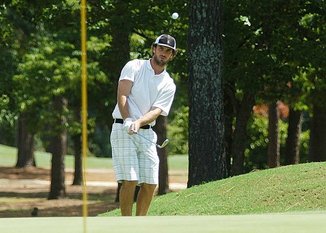 Getting onto the PGA Tour may be a dream, but the focus, dedication, and hours (and hours and hours) of practice it takes to achieve has a way of weeding out the dreamers. In Donald Constable’s case, we needed to take a hard, sober look at his game, beginning with why he ended his college career ranked No. 75 in the country, and not better. We decided to start with his short game — in particular, tightening his putting stroke so that it worked under pressure. I’m the eternal optimist whenever I’m working with a student and so is Donald’s step dad, Joe Ryan, when it comes to Donald’s golf game. Joe and I put together a plan that we thought could work for Donald. Four hours a day, five days a week. We putted — and still do — for hours a day, just focusing on being short and tight, getting the ball started on line. I would say out of the four hours a day, we spent three on Donald’s short game. When we played actual rounds, we always kept score and took it very seriously. We made sure that he never got comfortable with at 73 or 74; that wasn’t going to cut it in the weeks and months to come. Donald immediately started chipping and putting better and scoring lower as a result: leading up to Q School his scores during practice varied from 64 to 70. Once we began traveling to tournaments, we tried to prepare at every course like it was his home course so that he could shoot those low scores consistently. In order to be fully prepared, those practice rounds always need to be harder than the tournament itself. We arrived at each host golf course four days early and played 18 holes every day, with just nine holes the day before the tournament. When he wasn’t on the course, Donald was either eating, sleeping or resting in the Jacuzzi. He was able to keep his pre-tournament practice routine relatively light, because we’d already worked on everything we needed to by the time we arrived on site. When he wasn’t on the golf course, Donald was either eating, sleeping or resting in the Jacuzzi. Skills-wise, Donald was ready, but in golf the mental side of the game is just as important, and after taking our first real trip together I realized that we had probably more work to do off the golf course than on it. We spent a lot of time talking about what he would face regarding pressure and outcome during Q School. I was looking for the same sense of optimism and confidence in his game from Donald that I had seen work for champions like Tom Kite and John Harris. It was Donald’s reaction after one of the classiest, and potentially most devastating, moments I have seen in golf – during the U.S. Amateur qualifier the week before Q School started – that first made me believe he would make the PGA Tour.
1 Comment
|
Ernie Rosetop teaching professional and swing coach Archives
May 2013
Categories |
 RSS Feed
RSS Feed